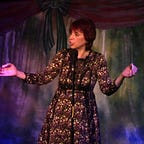How Creative Expression and Self-Reflection Can Support The Caregiver’s Journey
When Dawn Shedrick, LCSW — a leadership development coach, adjunct lecturer at Columbia University School Of Social Work, clinician and consultant — was a teen, her mother was diagnosed with a progressive form of multiple sclerosis. The oldest of 3, she became her mother’s caretaker. “When I was a younger she was active and did quite well, but has not been ambulatory since 2005, she shares. “At this point, she has chronic illness-related complex health problems in addition to age-related health problems, so my role has changed and intensified over time.”
Over the course of these many years of managing her mother’s needs, journaling has been her safe place for necessary, authentic self- expression. “It was the one place where I could really express the exhaustion, frustration, the anger, and most often the sadness of seeing my mother’s suffering,” she explains. With so many years of written self-reflection to draw on, and so many conversations with other people in similar circumstances — through her work as well as relationships with colleagues and friends— she saw a way to meet the growing need for creative, holistic, inexpensive self-care strategies.
Reading from the volumes of journals she filled over the years — always a spiral book that lays flat for ease of writing — she noticed a pattern in her caregiving entries: “they read as if I was responding to a prompt of some kind. But I wasn’t, I was responding to my own internal process. And from this observation, I thought a journal with prompts might be useful for other caregivers.” This is the origin story for her recently published Courageous Contemplation Guided Journal which includes journal prompts, creative play pages, free writing pages, affirmations, and an emotions wheel, all designed for the needs, concerns, emotions and struggles of caregivers.
Drawing from her own lived experience as well as her professional expertise, the prompts frame honest self-expression as courageous and compassionate toward self. This kind of self-honesty can be instrumental in going beyond our defenses to a deeper awareness of what we need and what might stand in the way of receiving it, needs often put to the side by people immersed in the needs of a loved one. Shedrick’s guide provides a structure for self-understanding through exploration of the full range of feelings and struggles caregivers can encounter, a way to mine one’s true experience for meaning. And there are real mental and physical health benefits to this kind of authenticity.
A study published in the journal Contemporary Clinical Trials Communication found that “interventions focused on life purpose, self-care goal-setting and engaging social support are promising methods for improving caregiver-reported outcomes and biomarkers of physiological stress and resilience.” A study of “kinship caretakers” published in 2020 shows a definite correlation between meaning-making and well-being.
November is National Family Caregivers Month, and an opportunity to learn about the needs and challenges of a role any of us could find ourselves at some point in our lives. A Sept 10 New York Times Opinion article discusses some sobering facts about the our “aging nation,” including that “around 42 million Americans are providing informal support to someone 50 or older, and many of them are struggling under the financial and psychological pressure.” A report published by the The American Association for Retired Persons states that “caregiving is increasing in prevalence and the U.S. population continues to age and live longer with more complex and chronic conditions. Caregivers feel the push and pull of providing care on their time, their financial well-being, their health, their family, their work, and their own personal well-being. They may find themselves in need of information, resources, benefits, or programs — but these things are often difficult to find or access, or too expensive to afford.”
Creative self-expression is a low-cost, always available, personal pathway for processing complex emotions and experiences, and journaling especially helpful for the conflicts that come with caregiving. “I feel like creating this book supported my meaning-making,” states Shedrick. “When I started the journal I was advanced enough in my own healing — even with the dramatic difficulty of dealing with my mom’s suffering — to find meaning in the whole experience as it has evolved over the years.”
One of the prompts in the Guided Journal is “What would you like to say to other siblings or community members that do not understand your experience as a caregiver?” Shedrick noted how differently she would respond to this question now than she would have 20 years ago. “How I handle the role is so different now. I’m much more understanding of what did or did not happen then. I know now that I can and should ask for help. I understand myself more clearly. I understand my siblings and my cousins, who are all involved in her care. Things can get heavy and dark when we are so directly involved with a loved one who is suffering, I hope this guide offers some light.”
Jude Treder-Wolff, LCSW, CGP, CPAI is a consultant and trainer, improviser and storyteller. She President of Lifestage, Inc which specializes in creative approaches to personal and professional development, focusing on improvisation, applied improvisation and storytelling.
